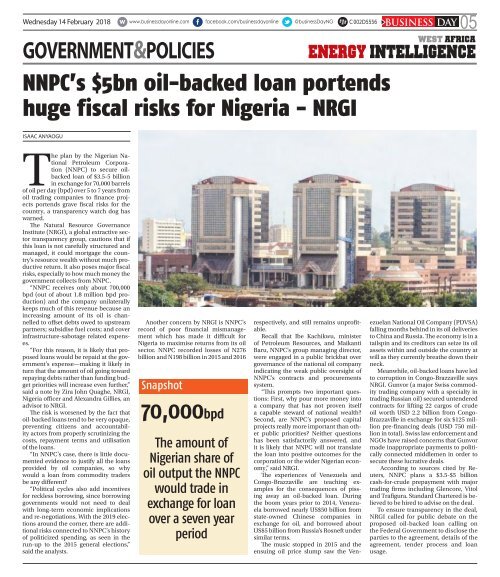BusinessDay 14 Feb 2018
Create successful ePaper yourself
Turn your PDF publications into a flip-book with our unique Google optimized e-Paper software.
Wednesday <strong>14</strong> <strong>Feb</strong>ruary <strong>2018</strong> C002D5556 BUSINESS DAY 05<br />
government&policies<br />
NNPC’s $5bn oil-backed loan portends<br />
huge fiscal risks for Nigeria - NRGI<br />
WEST AFRICA<br />
ENERGY intelligence<br />
ISAAC ANYAOGU<br />
The plan by the Nigerian National<br />
Petroleum Corporation<br />
(NNPC) to secure oilbacked<br />
loan of $3.5-5 billion<br />
in exchange for 70,000 barrels<br />
of oil per day (bpd) over 5 to 7 years from<br />
oil trading companies to finance projects<br />
portends grave fiscal risks for the<br />
country, a transparency watch dog has<br />
warned.<br />
The Natural Resource Governance<br />
Institute (NRGI), a global extractive sector<br />
transparency group, cautions that if<br />
this loan is not carefully structured and<br />
managed, it could mortgage the country’s<br />
resource wealth without much productive<br />
return. It also poses major fiscal<br />
risks, especially to how much money the<br />
government collects from NNPC.<br />
“NNPC receives only about 700,000<br />
bpd (out of about 1.8 million bpd production)<br />
and the company unilaterally<br />
keeps much of this revenue because an<br />
increasing amount of its oil is channelled<br />
to offset debts owed to upstream<br />
partners; subsidise fuel costs; and cover<br />
infrastructure-sabotage related expenses.<br />
“For this reason, it is likely that proposed<br />
loans would be repaid at the government’s<br />
expense—making it likely in<br />
turn that the amount of oil going toward<br />
repaying debts rather than funding budget<br />
priorities will increase even further,”<br />
said a note by Zira John Quaghe, NRGI,<br />
Nigeria officer and Alexandra Gillies, an<br />
advisor to NRGI.<br />
The risk is worsened by the fact that<br />
oil-backed loans tend to be very opaque,<br />
preventing citizens and accountability<br />
actors from properly scrutinizing the<br />
costs, repayment terms and utilisation<br />
of the loans.<br />
“In NNPC’s case, there is little documented<br />
evidence to justify all the loans<br />
provided by oil companies, so why<br />
would a loan from commodity traders<br />
be any different?<br />
“Political cycles also add incentives<br />
for reckless borrowing, since borrowing<br />
governments would not need to deal<br />
with long-term economic implications<br />
and re-negotiations. With the 2019 elections<br />
around the corner, there are additional<br />
risks connected to NNPC’s history<br />
of politicized spending, as seen in the<br />
run-up to the 2015 general elections,”<br />
said the analysts.<br />
Another concern by NRGI is NNPC’s<br />
record of poor financial mismanagement<br />
which has made it difficult for<br />
Nigeria to maximise returns from its oil<br />
sector. NNPC recorded losses of N276<br />
billion and N198 billion in 2015 and 2016<br />
Snapshot<br />
70,000bpd<br />
The amount of<br />
Nigerian share of<br />
oil output the NNPC<br />
would trade in<br />
exchange for loan<br />
over a seven year<br />
period<br />
respectively, and still remains unprofitable.<br />
Recall that Ibe Kachikwu, minister<br />
of Petroleum Resources, and Maikanti<br />
Baru, NNPC’s group managing director,<br />
were engaged in a public brickbat over<br />
governance of the national oil company<br />
indicating the weak public oversight of<br />
NNPC’s contracts and procurements<br />
system.<br />
“This prompts two important questions:<br />
First, why pour more money into<br />
a company that has not proven itself<br />
a capable steward of national wealth?<br />
Second, are NNPC’s proposed capital<br />
projects really more important than other<br />
public priorities? Neither questions<br />
has been satisfactorily answered, and<br />
it is likely that NNPC will not translate<br />
the loan into positive outcomes for the<br />
corporation or the wider Nigerian economy,”<br />
said NRGI.<br />
The experiences of Venezuela and<br />
Congo-Brazzaville are teaching examples<br />
for the consequences of pissing<br />
away an oil-backed loan. During<br />
the boom years prior to 20<strong>14</strong>, Venezuela<br />
borrowed nearly US$50 billion from<br />
state-owned Chinese companies in<br />
exchange for oil, and borrowed about<br />
US$5 billion from Russia’s Rosneft under<br />
similar terms.<br />
The music stopped in 2015 and the<br />
ensuing oil price slump saw the Ven-<br />
ezuelan National Oil Company (PDVSA)<br />
falling months behind in its oil deliveries<br />
to China and Russia. The economy is in a<br />
tailspin and its creditors can seize its oil<br />
assets within and outside the country at<br />
will as they currently breathe down their<br />
neck.<br />
Meanwhile, oil-backed loans have led<br />
to corruption in Congo-Brazzaville says<br />
NRGI. Gunvor (a major Swiss commodity<br />
trading company with a specialty in<br />
trading Russian oil) secured untendered<br />
contracts for lifting 22 cargos of crude<br />
oil worth USD 2.2 billion from Congo-<br />
Brazzaville in exchange for six $125 million<br />
pre-financing deals (USD 750 million<br />
in total). Swiss law enforcement and<br />
NGOs have raised concerns that Gunvor<br />
made inappropriate payments to politically<br />
connected middlemen in order to<br />
secure these lucrative deals.<br />
According to sources cited by Reuters,<br />
NNPC plans a $3.5-$5 billion<br />
cash-for-crude prepayment with major<br />
trading firms including Glencore, Vitol<br />
and Trafigura. Standard Chartered is believed<br />
to be hired to advise on the deal.<br />
To ensure transparency in the deal,<br />
NRGI called for public debate on the<br />
proposed oil-backed loan calling on<br />
the Federal Government to disclose the<br />
parties to the agreement, details of the<br />
agreement, tender process and loan<br />
usage.


















